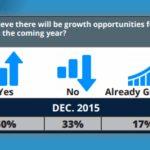 Vonage, probably the best-known name in VoIP (Voice over Internet Protocol) for home and business, hasreported revenue growth after a pivot to business customers for the fourth quarter and full year ended December 31, 2015.
Vonage, probably the best-known name in VoIP (Voice over Internet Protocol) for home and business, hasreported revenue growth after a pivot to business customers for the fourth quarter and full year ended December 31, 2015.
Revenue at Vonage business was $71 million in the fourth quarter up from $28 million from this time last year, representing a 149 percent year-over-year increase on a Generally Accepted Accounting Principles (GAAP) basis. For the full year 2015, business revenues were $219 Million up from $94 million in the prior year, representing a 132 percent increase.
Speaking about the strong revenue showings, Alan Masarek, Chief Executive Officer of Vonage, said, “We made enormous progress optimizing the profitability of Consumer Services, while successfully pivoting to the Unified Communications for Business market.”
Unified Communications (UC) — or Unified Communications-as-a-service (UCaaS) — is the latest communications trend targeting business customers that includes not only voice service, but also video chat, messaging, presence and Web collaboration.
The goal of UC is three-fold:
- To reduce the total communication costs for businesses
- To enable robust, seamless communications across smartphone, desktop phone, the PC and the Web, and
- To leverage these communication types to improve productivity and collaboration between staff, partners and customers.
These three UC functions that are affected over the cloud are vital for businesses of all sizes today, and explain why Vonage has been on an acquisition campaign in the last two years — snatching up companies in the B2B communications space.
The acquisitions are part of a larger effort by Vonage to attack the business market with cloud-based Unified Communications services.
In November 2013, Vonage acquired Vocalocity, which provides cloud-based communications services to small and medium-sized businesses, for $130 million. A year later, it acquired Telesphere Networks, a provider of UCaaS solutions to larger enterprises, for $114 million.
In 2015, it completed the acquisition of iCore, a provider of Broadsoft-based and Microsoft Lync UCaaS solutions for mid-market and enterprise customers, for $92M. The same year in 2015 it bought Simple Signal, which offers UCaaS services to small and medium businesses, for $25 million, and also acquired telecommunications service provider gUnify to integrate with Google, Zendesk, Salesforce, Clio and other customer relationship management (CRM) software.
Masarek said the acquisitions are part of a growth strategy that further positions Vonage as a leader in the UCaaS market.
These efforts appear to be paying off.
“During the year [2015], we successfully integrated the five companies we acquired over the last two years and built the industry’s broadest multi-channel sales distribution platform to address the full spectrum of the business market,” Masarek said in the year end report.
“Vonage Business now has a scalable, efficient platform capable of supporting continued rapid organic growth while successfully absorbing future acquisitions. I’m particularly proud of the stellar financial results we delivered in parallel with the operational improvements, acquisition integrations, and foundation building we completed,” Masarek continued.
“We generated consolidated revenue growth for the second consecutive year, and EBITDA was the highest in four years,” he added.
For 2016, the company says it expects total revenue will be in the range of $905 million to $920 million. Within this total revenue, Vonage Business GAAP revenue will grow roughly 50 percent from 2015 to 2016, prior to any additional acquisitions.
Vonage Business is expected to drive growth in the UCaaS sector, the company said.
[“source-smallbiztrends”]




